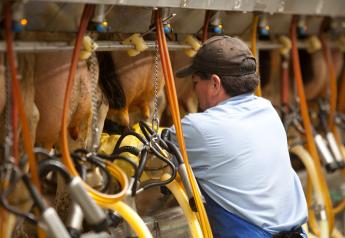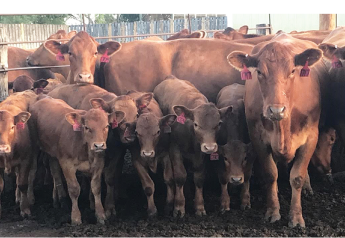Vet Techs Address the Need for a 'Living Wage and Respect'

This article was written by Susie Schuld. She is a veterinary technician at Jefferson Veterinary Clinic, Jefferson, Wis., where she's helped practitioners address animal health needs for beef producers and farmers for 22 years.
Recently, I was asked by a friend to review an article and give her my thoughts regarding it. As I was reading through the article, What Vet Techs Need (read it here https://bit.ly/3MTIx7U), I was thinking, “yes, yes and yes,” and also, “blah, blah, blah.” Honestly, this is not the first time an article has been written about what vet techs need, and we hear the story over and over again.
They tell us this information while we are in school, but we don’t care. We are young and just love animals! At least that’s what we all think as we go through school, graduate, get our credentials and enter the field. It is such an exciting time. Let’s face it, we all decided to join this field because of our passion for animals and our strong desire to help them. We all have a different backstory, but our common goal is always the same.
My backstory, I’m sure, sounds a lot like many of my colleagues’ backstories. I grew up on a small beef farm showing animals at the fair and always had a large variety of animals that came and went through our barn doors.
I have fond memories of our large animal vet, Dr. Ed Dettmers, coming out to our farm to do something with our cattle, and before he left, I always had a cat or some other critter that I wanted him to look at. He was always happy to oblige, even though now I know how busy he was, working long hours and running all over the county. He always made me feel like my little kitten with the goopy eyes was very important. I would run to the house with his bucket and fill it with hot water for him and intently watch everything he did on the farm.
Fast forward to high school. I knew right away I was going to apply to the veterinary technician (VT) program and couldn’t wait to start my career. I was lucky enough to get my internship at the very clinic that had inspired me, and 22 years later, I am still there as a full-time certified VT.
As with any career, there are always a lot of ups and downs. But one thing is always the same in our industry – it is a low-paying profession for all of us. Sometimes the long days, sad circumstances and stress make you question your career. As you get older, you may get married, start a family and build a life for yourself. But in a very low-paying profession, it is a struggle. Over the past 22 years, I have loved my job, hated my job, never would have dreamed of leaving my job and searched for other career paths.
It is a roller-coaster for a lot of vet techs. I, however, feel like I hit the jackpot with the clinic I work at. I have always felt respected, was able to choose my passion with cows and became a primarily large animal veterinary technician.
We have a lot of employee benefits, and I love my coworkers. But not everyone I’ve talked to is as lucky as me. I decided to pass the article on to other colleagues and get their input. Some of them are early in their careers, some are late in their careers, and some have left the profession. But all of their answers sound similar. Here is what seven veterinary technicians shared with me.
Response #1 from someone who was a CVT for a long time, left the field and went on to teach. She now works in a laboratory.
Hello, Susie. I concur wholeheartedly with this article. Especially when talking with former students that didn’t last more than a few years in the field. Lack of respect from veterinarians, low wages and horrible hours are what I’ve heard. Personally, I left the field because I wasn’t using my skills, except when I did large animal, and because of the low pay. Really, starting wage for a trash collector was $4 more per hour than I made.
Response #2 from a long-time VT who went to a specialty clinic for awhile after general practice and did consulting for clinics on the side.
Wage has always been an issue. It works as a supplemental income for a household but is nearly impossible to maintain a “mature adult life” on as a sole income. The common issues I see, regardless what region of the United States I am in is the work schedule. Today’s workforce commonly struggles with 40 hours per week. They want the 30 to 35 hours, just enough to get the full-time benefits. The thought of long days with uncertain times stresses them out and makes them anxious. They often value time off more than money. Wanting to feel appreciated is another key element. The struggle for management is knowing how to make them feel appreciated, because they are. Today’s workforce often needs constant and instant gratification.
Response #3 from another long-time CVT who still works in the field but no longer with animals.
Technicians definitely do not get paid what I feel they deserve. There were two big reasons I left the clinic – the pay and feeling like I had no room to advance. I guess you could technically say that I’m still in the field, though, because I’m still working as a technician, just in a different capacity. My pay is probably more than I would’ve ever made at the clinic, and the flexibility that I have is something I likely would not have had before. Plus, I do have a lot of opportunity and a lot more responsibility in my current position. But, I am also overwhelmed with responsibilities I’ve been given and definitely under-appreciated. I think it depends on the clinic. Some clinics very highly respect their technicians and recognize the huge contribution that they provide to making that clinic work smoothly, while others do not do that.
Response #4 from a long-time CVT who has worked at two different clinics during her career and now has decided to leave the workforce.
Working in two different clinics, I would say that pay is everything! Being valued was never really an issue for me, except that I didn’t get paid for all we need to know and do. Along with the crazy hours you have to work, the pay for the whole profession sucks for doctors and technicians. All the techs start in the field (to help animals), because that is why you went to school in the first place. But why stay if you can work at Kwik Trip or Wal-Mart for $16 per hour starting? Not as fulfilling, but you gotta pay the bills, right? Some of the techs at my previous clinic were going to leave only because of the pay. Then they got big raises and are now staying and not pursuing different careers. I think I have said for the last 15 years that something with the pay has to change.
Response #5 is from a CVT who has worked at the same clinic for 24 years.
I totally agree with the need for more pay per hour. I am making a little over $20 per hour and have worked my way up to that in 24 years. I was actually making more money 24 years ago at a clinic in a bigger city and took a pay cut to work where I am now. I feel not only the stress of dealing with schedules and all the gross stuff we do, but it’s more the stress of dealing with clients and the rudeness that’s making the pay not very worth it. But then, on the other hand, I have three weeks of vacation and health insurance, an IRA and a uniform allowance, so in that way I feel good about my pay. The article is very true as to doctors realizing your skills.
Response #6 from a CVT with 14 years of experience and currently at a clinic.
It sounds pretty true to me. I really think pay is definitely a touchy subject and that technicians are not paid enough. We do A LOT. Pharmacy, radiology, anesthesiology, caregiver, cleaning lady, receptionist, etc. Long hours and physically demanding work. I truly believe technicians are underpaid and not appreciated like they should be, in general, as a profession.
Response #7 from a CVT with seven years of experience.
I like this article. It hits very good points. I mean, they are right, we don’t make what we should for what we do. I don’t know if people necessarily always leave because of money. It is a factor, but if you were in a job where no one respects you or is not appreciative of your work, I’d want to leave as well.
In conclusion, every person seems to have a common opinion on what veterinary technicians need: pay and respect. We love what we do, but sometimes the physical and emotional demands are too high to stay when combined with the low income.







